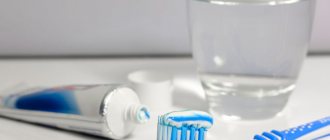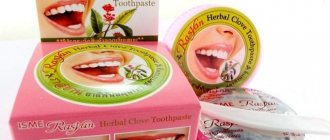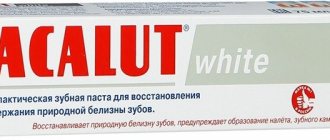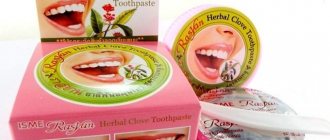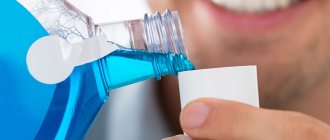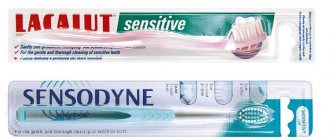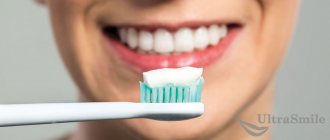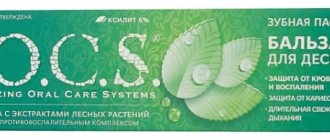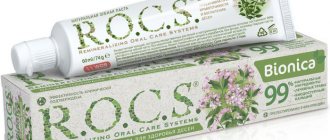- Treatment at the dentist's office
- The principle of operation of toothpastes for sensitive teeth
- Active substances in pastes
- Which desensitization paste to choose for a child?
- Examples of pastes for daily use
Increased sensitivity of teeth, medically known as hyperesthesia, is a disease that is familiar to every second adult.
The main manifestation is a painful reaction to hot or cold, sour or sweet foods, chewing, or brushing teeth. Enamel is the hardest tissue in the body, but even it is vulnerable to acidic and aggressive mechanical influences. In areas where the enamel becomes thinner, substances from outside enter the dentin, or more precisely, into the dentinal tubules. They contain many nerve endings that react to the stimulus.
Increased sensitivity of teeth is not a disease in the usual sense, but a symptom that can be caused by various reasons.
- Recent systemic
illnesses. - Dental
diseases. - Deficiency
of vital vitamins and microelements in the body due to an unbalanced diet. - Using toothbrushes with hard bristles
and abrasive toothpastes. - Habit of biting nails
or clenching teeth. - Poor
oral hygiene. - Recent in-office whitening
.
Depending on the cause, the way to deal with hypersensitivity will be different. How to reduce tooth sensitivity or prevent it - we tell you in this article.
Treatment at the dentist's office
To determine the clinical situation and causes of sensitivity, we recommend that you consult a dentist. The doctor will be able to prescribe procedures that are effective for your case.
- Fluoridation and remotherapy
- they strengthen the enamel, saturate the hard tissues of the tooth with useful elements and help reduce sensitivity. - Electrophoresis
- it improves the susceptibility of hard tissues to beneficial substances of fluorinated and remineralizing compounds. - Treatment of caries and filling
.
To maintain the effect of the procedures, the dentist may recommend enamel-strengthening products for home use - daily pastes, gels and rinses.
Sensodyne with fluoride
This paste has an amazing effect on sensitive teeth! The product has high reliability and quality. Dentists often recommend it to increase the level of beneficial minerals in the hard tissues of the oral cavity. The mixture penetrates deeply into the dentin layers, acting on the internal canals. At the same time, the nerve endings become less vulnerable, the pain subsides or goes away. The product contains fluoride and potassium nitrate, which removes inflammation and strengthens the units. This product is medicinal, it is also used for prevention. In order not to aggravate the problems, the substance is applied to a brush with soft bristles. The paste can be used by adults and adolescents after they reach 12 years of age.
Active substances in pastes
To quickly relieve pain, use toothpastes and gels with potassium
, which penetrates the dentinal tubules and anesthetizes the nerve.
And to strengthen the enamel and seal the dentinal tubules, you will need products containing fluoride
,
calcium
or
hydroxyapatite
.
Pastes with fluoride
Fluoride plays an important role for the body and, in particular, teeth.
- Makes bones strong and hard.
- Supports immunity.
- Prevents caries from developing.
The effectiveness of fluoride in preventing caries has been proven by many studies. Choose toothpastes with a fluoride concentration of at least 1000 ppm (preventative pastes) and from 1350 to 1500 ppm (medicinal pastes). The most popular fluoride-containing products are “Ftorlak”, “Fluocal”, “Diplen Denta F” films and Keystone gels. You can learn more about the benefits of fluoride in our article.
Pastes with calcium
An alternative strengthening element to fluoride is calcium. It provides teeth with strength and hardness. Some of the most effective products with it are dental gels GC Tooth Mousse, GC MI Paste Plus and gel for sensitive teeth ROCS Medical Sensitive.
Tooth gel GC Tooth Mousse Strawberry
Tooth gel GC MI Paste Plus Multifruit
Gel for sensitive teeth ROCS (ROCS) Medical Sensitive
Pastes with hydroxyapatite
Hydroxyapatite is a mineral that is the basis of bones and teeth (96% of enamel consists of it). It looks like a white powder. In dentistry, hydroxyapatite is included in dental products as an element that remineralizes and strengthens enamel.
Hydroxyapatite provides:
- decreased enamel sensitivity;
- replenishment of mineral deficiency;
- prevention of caries and its treatment at the white spot stage.
The absolute safety of hydroxyapatate is its main advantage.
The substance can be used in hygiene products even for children and pregnant women. ApaCare Repair restoring dental gel, Biorepair sensitivity reliever, Innova and Biorepair rinses and pastes will help solve the problem of sensitivity.
ApaCare Repair Restoring tooth gel
Biorepair drug for reducing sensitivity and restoring enamel
Suspension Splat Innova Liquid Enamel
INNOVA Intensive strengthening of hypersensitive teeth
Biorepair Mouthwash 500 ml
Toothpaste Biorepair Denti Sensibili PLUS
PresiDENT Sensitive
This substance is suitable even for very vulnerable enamel. Users note that the use does not cause discomfort. Main advantages of the product:
- The degree of abrasiveness is less than 25.
- Zero abrasion of enamel when cleaning.
- No injuries to the chewing organs and gums.
- High concentration of fluorine compounds - 1350 units.
All this allows for high-quality oral care. In addition, PresiDENT Sensitive eliminates mineral deficiencies in units. The enamel becomes strong and stops wearing off quickly. The level of vulnerability is significantly reduced. The active ingredients of the product are hydroxyapatite, sodium fluoride, potassium nitrate. The paste perfectly takes care of the oral cavity, eliminating discomfort and preventing caries.
Which desensitization paste to choose for a child?
The delicate enamel of baby teeth requires special delicate care. Children's toothpaste should not contain SLS, parabens, or titanium dioxide. If the paste foams a lot, it means that it contains SLS, and it is better to discard it.
It is important that the amount of abrasives is minimal (RDA - from 0 to 20).
Children's toothpaste should contain a small amount of fluoride: up to 4 years - 200 ppm, from 4 to 8 years - 500 ppm.
It is very important that the paste is not only effective and safe, but also tasty. This will help your baby learn to brush their teeth regularly.
Children's products for sensitive teeth
Criteria for choosing children's toothpaste:
- The fluoride concentration in the product should not exceed 1%.
- The paste should have a soft structure and not contain abrasive particles that can damage the child’s immature tooth enamel.
- It is necessary to choose a product that does not contain active chemical components. Otherwise, the baby may be poisoned or have an allergic reaction if the toothpaste is accidentally swallowed. These components include: saccharin and sodium lauryl sulfate.
- Many manufacturers make a mark on the product that allows you to choose a paste that is appropriate for the child’s age.
Examples of pastes for daily use
There are many toothpastes that can solve the problem of sensitivity. When choosing, you should pay attention to the following parameters.
- Active ingredient (fluorine, calcium, hydroxyapatite, potassium);
- its concentration;
- additives and impurities.
The best way to avoid oral diseases remains regular prevention. Below are examples of pastes for daily use and their main active ingredients, which have proven to be the most effective in combating sensitivity.
| Paste | Active substance |
| Theodent | theobromine (stimulates the formation of its own hydroxyapatite crystals), calcium |
| Apadent Sensitive | hydroxyapatite, calcium, potassium |
| Apagard Premium | hydroxyapatite, calcium |
| Biorepair paste line | hydroxyapatite |
| Miradent Mirasensitive hap+ | hydroxyapatite, fluorine, potassium |
| Remars Gel | calcium nitrate + ammonium hydrogen phosphate - a brushite crystal is formed, similar in composition to a hydroxyapatite crystal |
| Dentissimo For pregnant women and young mothers | calcium and hydroxyapatite |
| Innova range of pastes | hydroxyapatite |
| Splat Special Dream | hydroxyapatite |
| Elgidium Sensitive | fluorine |
| Iney Magic | hydroxyapatite, fluorine |
Daily oral hygiene using strengthening pastes is the best prevention of tooth enamel sensitivity at home.
Causes of sensitivity
- Smoking.
- Lack or improper oral hygiene.
- Thinning of tooth enamel.
- Genetic predisposition to the disease.
- Violation of mineral metabolism in the body.
- Wrong choice of toothpaste or toothbrush.
- Frequent consumption of too hard foods.
- Lack of calcium.
- The disease can occur as a result of improper teeth whitening.
- The disease appears as a result of various dental diseases: caries, periodontitis, etc. In some cases, sensitivity may be caused by the presence of tartar or defects in fillings.
- Drinking large amounts of coffee and alcohol.
- Regular presence of acidic foods in the diet: fruits and juices.
- The habit of grinding your teeth in your sleep (bruxism).
For people who suffer from this, experienced dentists recommend using special toothpastes for sensitive teeth, for example, ASEPTA SENSITIVE toothpaste is designed specifically to care for sensitive tooth enamel.
Toothpastes used for xerostomia
With xerostomia or decreased salivation, the activity of antimicrobial defense decreases and the degree of development of inflammatory processes in the oral cavity increases.
In such conditions, it is advisable to use toothpastes with low foaming properties and the absence of irritating components, with the addition of enzymes (lysozyme, lactoferrin, lactoperoxidase).
To accelerate the regenerative processes of the mucous membrane, biologically active components are introduced into toothpastes - enzymes, oil solutions of vitamins A and E, carotoline.
An example would be the following toothpastes: Biotene, Weleda Salf, Zendium.
1 Lacalut Extra Sensitive
The maximum effect among the entire brand series. There are several types of this paste. Most often, the choice of option depends on the degree of damage. One of its main advantages is that it acts in several directions at once. The first is blocking of nerve endings, which reduces the pain response. The second is strengthening the enamel, saturating its structure with useful minerals. After application, a protective coating is formed on the surface of the teeth, which does not disappear for several hours. It helps fluoride penetrate deep into the tooth. This significantly enhances the effect and leads to sensitivity returning to normal in a fairly short time. So Lacalut Extra Sensitive will very quickly reduce the risk of caries, restore the structure of the teeth and strengthen them.
The fluoride concentration per tube of toothpaste is 1476 units. This paste contains many active elements that have a positive effect on the situation in the mouth. Among them are sodium fluoride and potassium chloride. The entire composition is aimed at weakening hyperesthesia and strengthening the enamel. In the reviews, the vast majority of buyers claim that this paste really works. So she also deserves the Audience Award.
Ideal composition
The recommendations of experts boil down to the following: before making a final decision about which company is better to purchase a product, you need to carefully read its composition. What substances must be present? The main list is as follows:
- Pyrophosphates. Prevent the appearance of plaque and stones, slow down the growth of bacteria.
- Fluorine. Remineralizes enamel and helps strengthen its structure. Fights cariogenic bacteria, minimizes the risk of plaque formation. The main purpose is to strengthen teeth.
- Xylitol. Helps fight caries. Belongs to the category of natural components. Eliminates pathogenic bacteria. Remineralizes the coating, making it durable.
- Zinc citrate. Does not allow minerals to harden and bacteria to multiply.
- Bromelain, papain. Natural component. Ideal for those with increased sensitivity.
- Urea peroxide. Helps lighten enamel without damaging it. An integral component of whitening products.
- Extracts of chamomile, sage, oak bark. An ideal remedy for bleeding gums. Removes inflammation. Main components of organic products.
- Chlorhexidine. Strong antiseptic. Disinfects, with a healing effect, quickly tidies up the oral cavity.
- Peptides. The components are classified as organic. Regulate the condition of cells. Restore affected areas.
- Nano-hydroxyapatite. Designed to strengthen enamel, renew and remineralize it. Fills microcracks. A key element of high-value goods.
What are there
The products came into use in the 30s of the last century and replaced powders. Everyone liked the convenient packaging in the form of a tube. The main advantages of the product are plasticity, portability, compactness, and ideal taste characteristics. Popular models included glycerin, sodium carboxymethylcellulose, chemically precipitated chalk, sodium lauryl sulfate, perfume oil, water, preservative, and fragrances. Over time, new products, both domestic and foreign, began to be produced, including active components, the main purpose of which is therapeutic and therapeutic-prophylactic effects.
All manufactured products are divided into three main types:
| Type | Description |
| Medicinal | Consist of active components. They fight pathology. Prescribed for oral candidiasis and act as antifungal agents. |
| Hygienic | Used to combat deposits. Suitable for deodorizing the oral cavity. |
| Treatment and prevention | They are used to prevent the risk of periodontitis or other diseases and eliminate their negative factors. |
Therapeutic and prophylactic products are divided into the following subgroups:
- Deodorizing. The substance contains antiseptics.
- Having a positive effect on the mineralization of dental tissues. Calcium and fluorine compounds, macro- and microelements, and phosphates are used in production.
- Fighting the appearance of dental plaque. They consist of enzymes, antiseptics, fluoride compounds and mineral salts.
- Treating periodontitis and mucous membranes. Used for bleeding gums. The substance contains anti-inflammatory agents, antiseptics, enzymes, biologically active substances, hemostatic components, and mineral salts.
- Minimizing the risk of tartar formation. They consist of abrasives and crystallization inhibitors.
- Whitening. Includes abrasive components, crystallization inhibitors and sodium borate.
- For sensitive teeth. Ingredients such as potassium and strontium compounds and formaldehyde are used in production.
Therapeutic and prophylactic drugs are also divided into:
- Combined. They consist of two or more therapeutic and prophylactic substances, the main task of which is to cure and prevent the oral cavity.
- Complex. They are made from one or more therapeutic and prophylactic ingredients that fight pathological processes.
Based on the method of application, products can be divided into the following types:
- for one-time use;
- for daily care;
- for easy rubbing and application after brushing your teeth.
